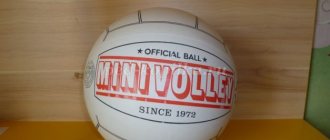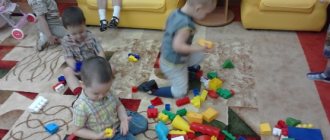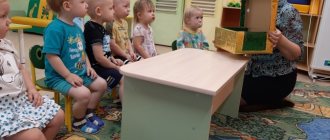Thematic planning “From birth to school”
Vdovina Olesya Alexandrovna
Thematic planning “From birth to school”
Thematic planning of MADOU No. 131 “General developmental kindergarten”
(in accordance with the program “From birth to school "
edited by N. E. Veraksy, T. S. Komarova, M. A. Vasilyeva, taking into account the regional component)
Compiled by: senior teacher: Vdovina O. A.
Preparatory group
Topic of the week Contents of the work Options for final events
"Day of Knowledge"
4th week of August
"We are future schoolchildren "
To consolidate knowledge about
school , why you need to study, who teaches what at school . Excursion to a school in our district (No. 24, 89)
1st week of September
"Who will meet us at school "
To form an idea of the profession of a teacher and
the “profession”
of a student, a positive attitude towards these types of activities Holiday
“Day of Knowledge”
“Autumn”
2nd week of September
"People's Labor in Autumn"
Continue to introduce agricultural professions, including those of our region.
Expand knowledge about creative professions. Photo exhibition “Agricultural professions of our region”
or
“Man is famous for his work”
3rd week of September
"Seasons"
Expand children's knowledge about autumn, including in Kuzbass, about the seasons, the sequence of months in the year.
Exhibition of joint creativity between children and parents “Gifts of Autumn”
4th week of September
"Autumn time is the charm of the eyes"
Expand children's understanding of the features of displaying autumn in a work of art, including our region.
To consolidate knowledge about the rules of safe behavior in nature. Holiday "Autumn"
"My city, my country, my planet "
1st week of October
"Motherland"
Expand children's ideas about their native land.
Continue to introduce the sights of the region in which the children live. To cultivate love for the “small Motherland”
, pride in the achievements of one’s country.
Photo exhibition “My small homeland - Kemerovo”
2nd week of October
“The Earth is our common home”
of the planet Tell children that the Earth is our common home, there are many different countries on Earth, it is important to live in peace with all peoples, to know and respect their culture, customs and traditions. Making a Model “The Earth is our common home”
“National Unity Day”
3rd week of October
"Russia is my homeland"
Provide children with basic information about the history of Russia.
Cultivate respect for people of different nationalities and their customs. Quiz “My Motherland – Russia”
4th week of October
"Anthem, flag, coat of arms of Russia"
To consolidate knowledge about the flag, coat of arms, and anthem of Russia, the Kemerovo region, Kemerovo.
Flash mob “Anthem, flag, coat of arms of Kemerovo”
Master class for parents “Making a flag”
1st week of November
"Moscow is capital of Russia"
Expand your understanding of Moscow - the main city, the capital of Russia.
Expand children's understanding of their native country, public holidays and holidays of our region (City Day, Miner's Day, etc.)
Entertainment "National Unity Day"
2nd week of November
"Heroes of Russia"
Deepen and clarify ideas about the Motherland - Russia.
Tell children about the heroes of our country, including those from Kuzbass. Quiz “Heroes of Russia”
“New Year”
3rd week of November
“New Year’s holiday is coming soon”
Expand your knowledge about the New Year holiday. Introduce the traditions of New Year celebrations, talk about Father Frosts in other countries and about the residence of Father Frost at the Tomsk Pisanitsa
.
Entertainment “Santa Claus Games”
4th week of November
“Winter will come, the holiday will bring”
Involve children in active and diverse participation in preparation for the holiday and its implementation. Competition of Christmas decorations for the district Christmas tree
1st week of December
"New Year Traditions"
Introduce the basics of holiday culture.
Maintain the feeling of satisfaction that arises from participating in collective pre-holiday activities. Competition for the best group design for the New Year
2nd week of December
“The New Year is coming to visit us”
Form an emotionally positive attitude towards the upcoming holiday, a desire to actively participate in its preparation.
Children's drawing competition “My letter to Santa Claus”
3rd week of December
“The children really like the beautiful Christmas tree”
Encourage the desire to congratulate loved ones on the holiday, present gifts made with their own hands.
Exhibition
4th week of December
“Everyone is celebrating the New Year - they joined in a round dance”
Continue to introduce the traditions of New Year celebrations in various countries and our region. New Year holiday
"Winter"
2nd week of January
"Winter-winter"
Continue to introduce winter.
Expand and enrich knowledge about the characteristics of winter nature, including our region (cold, frost, snowfall, strong winds, people’s activities in the city, in the countryside, safe behavior in winter. Consolidate knowledge about folk holidays, festivities. Folk holiday “Carols” »
3rd week of January
"Winter sports, winter fun"
Continue to introduce winter sports
(hockey, snowboarding, cross-country skiing, bobsleigh)
and winter fun in our region
(slide rides, dog sledding, reindeer riding, etc.) “Winter Spartakiad with Parents”
4th week of January
"Winter Nature"
Continue to introduce the nature of the Arctic and Antarctic. To form ideas about the characteristics of winter in different latitudes and in different hemispheres of the Earth and our region. Model with the nature of the Arctic and Antarctic
"Defender of the Fatherland Day"
1st week of February
"Our Army"
Expand children's understanding of the Russian army.
Introduce to different branches of the military (infantry, naval air, tank forces, military equipment. Literally - musical evening “Stories about relatives who served in the troops”
Excursion to the military museum.
2nd week of February
"Future Defenders of the Motherland"
To educate in the spirit of patriotism and love for the Motherland. Talk about the difficult but honorable duty to defend the Motherland, protect its peace and security; about how during the wars our great-grandfathers, grandfathers, and fathers bravely fought and defended our country from enemies. Exhibition dedicated to “Defender of the Fatherland Day”
3rd week of February
"February 23 Holiday"
Expand gender ideas, develop in boys the desire to be strong, courageous, and become defenders of the Motherland; to instill in girls respect for boys as future defenders of the Motherland. Holiday February 23 “Defender of the Fatherland Day”
"International Women's"
4th week of February
"My family"
Involve children in making gifts for mother, grandmother, and teachers.
Cultivate a caring and sensitive attitude towards those closest to you, develop the need to please loved ones with good deeds. Exhibition “Gift for beloved mother, grandmother”
1st week of March
"Mother's day"
Expand gender ideas, educate boys to the idea that men should treat women with care and respect.
Cultivate respect for teachers. Holiday “March 8”
“Folk culture and traditions”
2nd week of March
"Decorative and applied arts"
Continue to introduce folk decorative and applied art (Gzhel, Khokhloma, Zhostovo, Mezen painting, ceramic products, folk toys. Folk decorative and applied art of our region - wood carving, wickerwork, artistic ceramics and birch bark products, embroidery. Joint exhibition children's creativity
“Decorative and applied crafts”
3rd week of March
"Folk Culture"
Continue to introduce children to folk songs and dances.
Expand ideas about the diversity of folk art and crafts.
Cultivate an interest in art, including that of your native land; love and respect for works of art. Holding a national holiday
4th week of March
"Traditions of the Russian people"
Introduce folk traditions and customs.
Expand your understanding of the traditions and customs of the peoples of Russia and Kuzbass. Sports entertainment "Folk Games"
"Spring"
1st week of April
"Spring is red"
To form in children generalized ideas about spring, the adaptability of plants and animals to changes in nature, including our region.
Holiday “Spring is Red”
2nd week of April
“Nature woke up and smiled at spring”
Expand knowledge about the characteristic signs of spring: the arrival of birds,
about the connection between the phenomena of living and inanimate nature and seasonal types of labor; about spring changes in nature, including Kuzbass. "Earth Day - April 22"
"Victory Day!"
3rd week of April
"Heroes of Space"
Raise children in the spirit of patriotism and love for the Motherland. Expand children's understanding of space; bring to the understanding that space exploration is the key to solving many problems on Earth; tell children about Yuri Gagarin, Alexei Leonov and other space heroes. Making the “Space”
Excursion to Leonov Airport
4th week of April
"Great Heroes of the Past War"
Introduce monuments to the heroes of the Great Patriotic War, including Kuzbass.
Expand knowledge about the heroes of the Great Patriotic War.
Tell children about the military awards of their grandparents and parents. Exhibition of creative works dedicated to the holiday of May 9
Excursion to the monuments to the war heroes of our region
1st week of May
"Great Day - Victory Day"
Expand knowledge about our country’s victory in the war. Talk about the continuity of generations of defenders of the Motherland: from epic heroes to heroes of the Great Patriotic War.
Holiday “Victory Day”
“Goodbye, kindergarten! Hello school !
2nd week of May
“Goodbye, kindergarten!”
Organize all types of children's activities around the theme of saying goodbye to kindergarten and going to
school . Preparation of a portfolio “Kindergarten graduate”
3rd week of May
"Soon to school "
Form an emotionally positive attitude towards the upcoming entry into 1st grade.
Newspaper “Our Graduates”
4th week of May
“Goodbye, kindergarten! Hello, school ! Continue to form an emotionally positive attitude towards the upcoming holiday, the desire to actively participate in its preparation. Holiday "Goodbye, kindergarten!"
During the summer, the kindergarten operates in vacation mode (1st week of June – 3rd week of August)
Senior group
Topic of the week Contents of the work Options for final events
"Day of Knowledge"
4th week of August “Feast of Knowledge”
Form friendly, friendly relationships between children; continue to introduce the kindergarten as the child’s immediate social environment, pay attention to the changes that have occurred: (the fence is painted, new tables have appeared, etc.)
;
expand ideas about the professions of kindergarten employees (teacher, assistant teacher, music director, doctor, janitor). To develop children's cognitive motivation, interest in school and books. Thematic tour of the kindergarten Holiday “Day of Knowledge”
“Autumn”
1st week of September “Time of year – autumn”
To form generalized ideas about autumn as a time of year, the adaptability of plants and animals to changes in nature, natural phenomena;
give initial ideas about ecosystems , natural areas, including the Kemerovo region. Layout “Autumn Forest”
2nd week of September
"Village Professions"
Continue to introduce agricultural professions.
Photo gallery “Professions of rural residents of Kuzbass”
3rd week of September
"Gifts of Autumn"
Expand children's knowledge about autumn, expand their understanding of inanimate nature, including our region.
Exhibition of joint creativity between children and parents “Gifts of Autumn”
4th week of September
"Golden Autumn"
To consolidate knowledge about the rules of behavior in nature.
Contribute to the creation of positive emotional experiences for children and parents from a joint holiday. Holiday "Autumn"
"I will grow up healthy"
1st week of October
"I and my family"
Consolidate knowledge of home address and telephone number, names and patronymics of parents;
expand knowledge about yourself and your family. Expand children's knowledge about where their parents work, their professions, and how important their work is to society. Photo exhibition “We are the family of Kuzbass”
2nd week of October
"I will grow up healthy"
Expand ideas about a healthy lifestyle; foster a desire to lead a healthy lifestyle; build positive self-esteem.
Open health day
"Day of National Unity"
3rd week of October “Native side”
Expand children's understanding of their home country, home region, city, and national and local holidays.
Photo exhibition “My Small Motherland”
4th week of October
"We are Russians"
Introduce the history of Russia. Arouse interest in the history of your country, your region; cultivate a sense of pride in one’s country and love for it. Quiz “My Russia”
1st week of November
"Symbols of Russia"
Introduce the history of Russia, the coat of arms, the flag, the melody of the anthem of our country and Kuzbass.
Tell about the people who glorified Russia, about the fact that the Russian Federation (Russia)
is a huge multinational country.
Master class for parents “Making a flag”
2nd week of November
“Moscow is the main city of Russia”
To expand children’s knowledge that Moscow is the main city of Russia, the capital of our Motherland, and Kemerovo is the capital of our small homeland.
Quiz “My Capital”
“New Year”
3rd week of November
"Fun of Santa Claus"
Give knowledge about the New Year holiday.
Tell about the residence of Father Frost on the Tomsk Pisanitsa
.
Entertainment “Santa Claus Games”
4th week of November
“New Year’s holiday is coming soon”
Lay the foundations of holiday culture. Involve children in active and diverse participation in preparation for the holiday and its implementation. Competition of Christmas tree decorations for the district Christmas tree (exhibition)
1st week of December
“Yolka came to visit us”
Arouse an emotionally positive attitude towards the upcoming holiday, a desire to actively participate in its preparation.
Competition for the best group design for the New Year
2nd week of December
"New Year Traditions"
To introduce the traditions of celebrating the New Year in different countries and in our region.
Children's drawing competition “My letter to Santa Claus”
3rd week of December
“The New Year is coming to visit us”
Create a desire to congratulate loved ones on the holiday, present gifts made with your own hands.
Foster a sense of satisfaction from participating in collective pre-holiday activities. Literary and musical evening “My Favorite New Year”
4th week of December
“New Year - the children began to dance”
Involve active, diverse participation in preparation for the holiday and its implementation.
Holiday "New Year"
"Winter"
2nd week of January
"Signs of Mother Winter"
Expand and enrich children's knowledge about the characteristics of winter nature, including our region (cold, frost, snowfall, strong winds, about the activities of people in the city, in the countryside. Folk holiday
"Carols"
3rd week of January
"Winter Olympics"
Continue to introduce children to winter as a season, to winter sports
(hockey, snowboarding, cross-country skiing)
.
Talk about safe behavior in winter. “Winter Spartakiad with Parents”
4th week of January
"Winter Nature"
To form primary research and educational interest through experimentation with water and ice. Layout with winter nature
"Defender of the Fatherland Day"
1st week of February
"Heroes of our country"
Talk about the difficult but honorable duty of defending the homeland, protecting its peace and security;
about how during the war years our great-grandfathers, grandfathers, and fathers bravely fought and defended our country from enemies; educate in the spirit of patriotism and love for the Motherland. Literal - musical evening “Stories about relatives who served in the troops”
2nd week of February
"Our Army"
Continue to expand children’s understanding of the Russian army, introduce them to different branches of the military (infantry, naval, air, tank forces, military equipment. Exhibition dedicated to
“Defender of the Fatherland Day”
Excursion to the military museum of Kemerovo
3rd week of February
"Defender of the Fatherland Day"
Expand gender ideas, instill in boys the desire to be strong, courageous, and become defenders of the Motherland; to instill in girls respect for boys as future defenders of the Motherland.
Holiday February 23 - “Defender of the Fatherland Day”
"International Women's"
4th week of February
“Soon, soon the holiday!”
Organize all types of children's activities around the theme of family, love for mother, grandmother; cultivate respect for teachers. Involve children in making gifts for mother, grandmother, and teachers. Cultivate a caring and sensitive attitude towards those closest to you, the need to please loved ones with good deeds.
Exhibition “Gift for beloved mother, grandmother...”
1st week of March
"International Women's Day"
Expand gender ideas, instill in boys the idea that men should treat women with care and respect.
Holiday “March 8”
“Folk culture and traditions”
2nd week of March
"Decorative and applied arts of our people"
Continue to introduce children to folk arts and crafts
(Gorodetsky, Polkhov-Maidanovsky, Gzhel)
. Introduce people to the decorative and applied arts of our region - wood carving, wicker weaving, birch bark products, etc.
Joint exhibition of children's creativity
“Decorative and applied crafts”
3rd week of March
"My native land"
Continue to introduce children to folk traditions and customs.
Talk about the Russian hut and other buildings, their interior decoration, household items, and clothing. Sports entertainment “Folk Games”
4th week of March
"Folk toys"
Expand ideas about folk toys
(matryoshka dolls - Gorodets, Bogorodskaya; spillikins; Dymkovo toys)
.
Amulet dolls of the Kemerovo region (diaper doll, “columns”
, ash doll, woolen doll).
Conducting folklore entertainment (quiz)
“Spring”
1st week of April
"Spring is red"
To form a generalized idea of spring as a time of year, the adaptability of plants and animals to changes in nature.
Expand knowledge about the characteristic signs of spring, the arrival of birds, about spring changes in nature, including in Kuzbass (snow melts, rivers flood, birds arrive, grass and flowers appear faster on the sunny side than in the shade). Holiday “Spring is Red”
2nd week of April
"Space distances"
Expand knowledge about the connection between the phenomena of living and inanimate nature and seasonal types of labor.
To form children's ideas about space; tell children about Yuri Gagarin, Alexei Leonov and other space heroes. Making a model of “Space Distances”
“Victory Day!”
3rd week of April
"Heroes of the Great Patriotic War"
Expand knowledge about the heroes of the Great Patriotic War, about the victory of our country in the war;
introduce monuments to the heroes of the Great Patriotic War, including Kemerovo. Excursion to the monuments to war heroes Quiz “Earth Day - April 22”
4th week of April
"Labour Day"
Raise children in the spirit of patriotism, love for the Motherland, native Kuzbass. Exhibition of creative works dedicated to the holiday of May 9
1st week of May
"Great Victory Day"
Enrich the spiritual world of children through reference to the heroic past of our country and our region.
Holiday "Victory Day"
"Summer"
2nd week of May
“Summer will come to us soon”
To form in children generalized ideas about summer as a time of year, the signs of summer in general and in our region.
Layout “Summer”
3rd week of May
"Summer is red - the sun is clear"
Expand and enrich ideas about the influence of heat and sunlight on the lives of people, animals and plants;
that there is a lot of food for animals, birds and their young in the summer. Exhibition of children's works "Red summer is coming, the sun will be clear!"
4th week of May
"Summer! Ah, summer! Expand your understanding of plants, fruits, berries, vegetables, edible and inedible mushrooms, including the Kemerovo region. Holiday "Summer"
During the summer, the kindergarten operates in vacation mode (1st week of June – 3rd week of August)
Program 5-7 years “From birth to school” 2021-22
Disadvantages in the development of coherent speech are associated with the inability to construct a coherent text using all structural elements (beginning, middle, end), and to connect parts of a statement in various ways through chain and parallel connections.
Educational field "Artistic and aesthetic development"
In productive activities, children know what they want to portray and can purposefully follow their goal, overcoming obstacles and without abandoning their plan, which now becomes proactive. They are able to depict anything that arouses their interest. The created images become similar to the real object, are recognizable and include many details. This is not only an image of individual objects and plot pictures, but also illustrations for fairy tales and events. Drawing techniques are being improved and complicated. Children can convey the characteristic features of an object: shape, proportions, color. In drawing, children can create color tones and shades, master new ways of working with gouache (in “wet” and “dry”), use methods of applying a color spot in different ways, and color as a means of conveying mood, state, attitude towards the depicted or highlighting the main thing in the drawing . Decorative decoration techniques become available.
In modeling, children can create images from nature and from imagination, also conveying the characteristic features of familiar objects and using different methods of modeling (plastic, constructive, combined).
In appliqué, one learns the techniques of cutting out identical shapes or parts from paper folded in half, like an accordion. They develop a sense of color when choosing different shades of paper.
Children are able to construct buildings from a variety of building materials according to diagrams, photographs, given conditions, and their own ideas, supplementing them with architectural details. Make toys by folding paper in different directions. Create figurines of people, animals, and heroes of literary works from natural materials.
The most important achievement of children in this educational area is the mastery of composition (frieze, linear, central) taking into account spatial relationships, in accordance with the plot and their own design. Children can create multi-figure plot compositions by placing objects closer and further away.
They show interest in group work and can negotiate with each other, although they still need the help of the teacher.
The world is not only stable in the child’s perception, but can also act as relative (everything is possible for everyone); the conditional plan of action that takes shape in the previous period of development is embodied in the elements of imaginative thinking, reproducing and creative productive imagination; the foundations of the symbolic function of consciousness are formed, sensory and intellectual abilities develop. By the end of the period, the child begins to put himself in the place of another person: to look at what is happening from the perspective of others and understand the motives of their actions; independently build an image of the future result of a productive action. Unlike a young child, who is only capable of elementary discrimination between such spheres of reality as the natural and man-made world, “other people” and “I myself,” by the end of preschool age ideas about the various aspects of each of these spheres are formed. Evaluation and self-esteem arises. By the age of 7, the prerequisites for a successful transition to the next level of education are formed.



